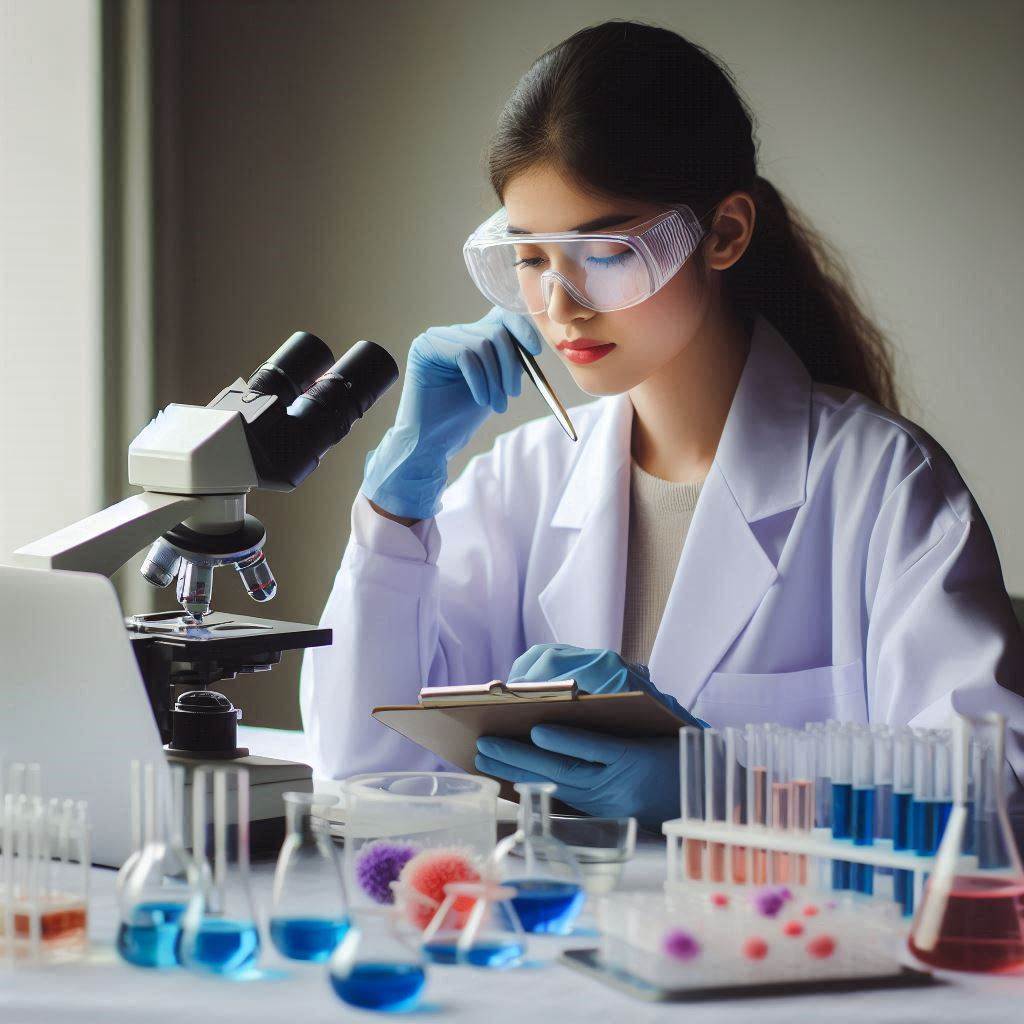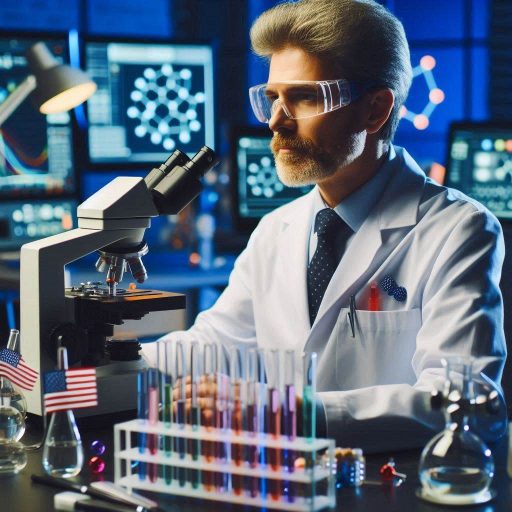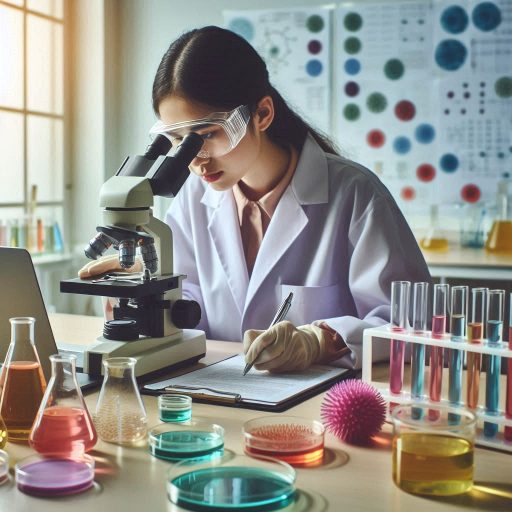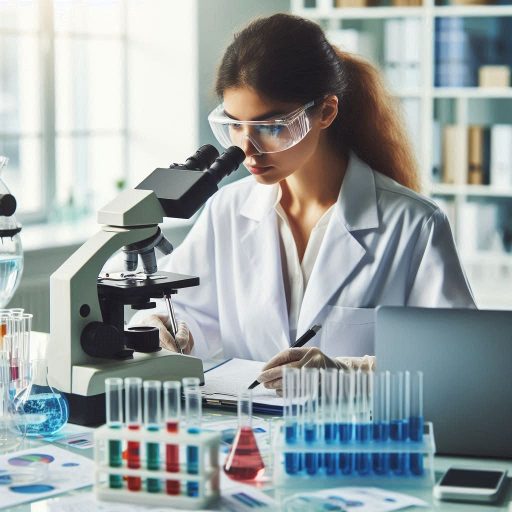Introduction
Women have made significant contributions to microbiology, shaping the field and driving scientific progress.
However, their achievements often go unrecognized, despite their impact on research, innovation, and society.
It is essential to celebrate these contributions to inspire future generations of women in science.
In this blog post, we will explore the history of pioneering women in microbiology and highlight their groundbreaking work.
We will showcase notable women making waves in microbiology, highlight their challenges, and promote diversity and inclusivity.
Additionally, we will share inspiring success stories of women who have overcome obstacles and achieved remarkable breakthroughs in microbiology.
We’ll also address the role of mentorship and supportive networks in helping women thrive in the field.
Finally, we’ll examine future opportunities and trends, encouraging more women to pursue careers in microbiology and other STEM fields.
Recognizing and celebrating women’s contributions in microbiology builds a more inclusive environment.
This empowers women to excel and drive future discoveries.
Historical Overview
Some Pioneering Women in the Field of Microbiology
Women have made significant contributions to microbiology since the early days of the field.
One of the earliest pioneers was Fanny Hesse, who developed the use of agar as a culture medium.
Her contribution revolutionized the way microbiologists study bacteria and other microorganisms.
Without her innovation, microbial culture methods would be less efficient and less precise.
Alice Catherine Evans was another trailblazer in microbiology.
She discovered that bacteria found in milk and cheese caused brucellosis, a disease affecting both humans and animals.
Evans’ findings led to the implementation of milk pasteurization, which greatly reduced the risk of foodborne diseases.
Esther Lederberg made major advancements in bacterial genetics.
She discovered the lambda bacteriophage, a virus that infects bacteria, and pioneered techniques used to study bacterial reproduction.
Her work paved the way for future research in molecular genetics and gene transfer.
Their Significant Contributions and Achievements
The contributions of these women not only impacted microbiology but also public health and scientific methodologies.
Fanny Hesse’s agar innovation continues to be a fundamental tool for microbiologists worldwide.
Researchers still use it today to isolate and study different microbial strains.
Alice Evans’ discovery of Brucella bacteria shaped the dairy industry by promoting the pasteurization of milk.
Her work helped prevent the spread of brucellosis, significantly improving public health safety.
Evans also became the first woman president of the Society of American Bacteriologists, setting a precedent for female leadership in science.
Esther Lederberg’s groundbreaking work in bacterial genetics advanced our understanding of genetic material transfer between organisms.
Her discovery of lambda phage laid the foundation for future research in molecular biology.
Her achievements earned her recognition as a leading figure in genetics, although her contributions were often overshadowed by her male counterparts.
How Their Work Has Impacted the Field and Paved the Way for Future Generations
The work of these pioneering women has had a lasting impact on microbiology and inspired future generations of scientists.
Fanny Hesse’s agar medium is still an essential tool for cultivating bacteria, and it continues to drive microbiological research in fields such as medicine, agriculture, etc.
Alice Evans’ research on foodborne diseases has saved countless lives by preventing the spread of infections through dairy products.
Her accomplishments also broke barriers for women in microbiology, encouraging more women to pursue careers in the field.
Esther Lederberg’s research opened new avenues for studying genetic material and bacterial reproduction.
Her discoveries have enabled advances in molecular biology, biotechnology, and genetic engineering.
By overcoming societal obstacles, these women not only contributed groundbreaking knowledge but also demonstrated that women could lead and innovate in the sciences.
The contributions of pioneering women in microbiology have left a lasting legacy.
Their work has not only advanced scientific understanding but also paved the way for future generations of women to enter and excel in the field.
Notable Women in Modern Microbiology
Some Contemporary Women Microbiologists Making Waves in the Field
Today, several women are leading groundbreaking research in microbiology.
One such scientist is Dr. Jennifer Doudna, a co-developer of the CRISPR-Cas9 gene-editing technology.
Her innovation has revolutionized genetic research by allowing precise alterations to DNA sequences.
Dr. Doudna’s work has applications in treating genetic disorders, advancing disease research, and developing therapies.
Dr. Rita Colwell is another pioneering figure, recognized for her research on waterborne diseases.
Her studies focus on the spread of cholera and other diseases linked to water contamination.
She has developed predictive models that help health officials anticipate and prevent cholera outbreaks.
Dr. Marie-Alice Mutabaruka, a microbiologist from Rwanda, is advancing microbial biodiversity research.
Her work on soil microorganisms is crucial for improving agriculture and ecosystem health.
Through her studies, she contributes to soil fertility and sustainable farming in Africa.
Their Current Research, Projects, and Innovations
Dr. Jennifer Doudna’s research continues to push CRISPR technology forward, particularly in its medical applications.
She and her team explore its potential for curing genetic diseases like muscular dystrophy and sickle cell anemia.
Doudna’s lab also investigates CRISPR’s role in cancer treatment, aiming to develop new therapeutic strategies.
Dr. Rita Colwell’s current projects focus on the environmental factors influencing the spread of infectious diseases.
She is particularly interested in how climate change impacts waterborne diseases.
Her predictive models use environmental data to forecast cholera outbreaks, giving health organizations the tools to respond quickly.
Dr. Marie-Alice Mutabaruka is leading research in Africa, where she studies soil microbes to boost agricultural productivity.
Her work highlights the role of microorganisms in maintaining soil health.
By understanding microbial diversity, she helps develop farming techniques that promote long-term sustainability and food security.
Relevance of Their Work in Today’s Society and Science Community
The research of these women addresses crucial challenges in modern science and society.
Dr. Jennifer Doudna’s CRISPR technology has opened new avenues for treating previously untreatable genetic conditions.
Her innovations have far-reaching implications for medicine, agriculture, and ethical debates surrounding genetic modification.
Dr. Rita Colwell’s research is pivotal in preventing disease outbreaks, especially in vulnerable regions.
As climate change continues to influence global health, her predictive models are vital for managing waterborne diseases.
Her interdisciplinary work shows how microbiology can address environmental and public health issues.
Dr. Marie-Alice Mutabaruka’s studies on soil microbes contribute to Africa’s food security and climate resilience.
Her work is essential in developing sustainable farming practices that can withstand climate shifts.
By enhancing soil health, she is helping improve agricultural productivity while safeguarding ecosystems.
Women like Dr. Jennifer Doudna, Dr. Rita Colwell, and Dr. Marie-Alice Mutabaruka are transforming microbiology today.
Their research impacts genetic medicine, environmental health, and food security, demonstrating the importance of women in advancing science.
Read: Essential Skills and Tools for Modern Chemists in America
Challenges Faced by Women in Microbiology
Gender Disparities and Challenges Women Face in Microbiology
Women in microbiology often face significant gender disparities.
Despite their achievements, many struggle to receive equal recognition and opportunities as their male counterparts.
Women are underrepresented in leadership positions, and the number of female microbiologists at senior levels remains low compared to men.
The gender gap starts early, with fewer women pursuing advanced degrees in microbiology.
Even for those who do, career progression is frequently hindered by structural barriers.
Issues Such as Bias, Discrimination, and Barriers to Advancement
Bias and discrimination continue to be persistent issues for women in microbiology.
Many women experience implicit bias in hiring, promotions, and research funding.
Studies show that male candidates are often favored for leadership roles and grants, even when female candidates have equal qualifications.
Discrimination manifests in various forms, from being overlooked for speaking opportunities at conferences to facing challenges in securing research funding.
Women often need to work harder to prove their capabilities, despite having the same expertise as their male colleagues.
Barriers to advancement also arise from limited networking opportunities and mentorship for women.
Many women struggle to find mentors who can guide them through the academic and professional challenges in microbiology.
The lack of visible female role models in the field reinforces the gender imbalance and discourages younger women from pursuing microbiology careers.
Work-life balance is another hurdle, especially for women balancing family responsibilities with their careers.
Maternity leave and caregiving duties can slow down their research progress, leading to fewer publications and slower career advancement.
These challenges create a cumulative disadvantage over time, contributing to the gender disparity in senior positions.
Importance of Promoting Diversity and Inclusivity in the Field
Promoting diversity and inclusivity in microbiology is crucial for advancing the field.
Diverse teams foster innovation by bringing different perspectives, ideas, and problem-solving approaches.
When women are equally represented, scientific research becomes more comprehensive and inclusive.
Tackling gender bias requires institutions to actively promote policies that support gender equality.
This includes implementing mentorship programs, offering equal opportunities for research funding, and ensuring fair promotion practices.
Additionally, more efforts must be made to provide work-life balance support, such as flexible schedules and adequate parental leave policies.
The importance of visible female role models in microbiology cannot be overstated.
Highlighting the accomplishments of successful women in the field inspires future generations of scientists and encourages more women to enter and remain in the field.
Addressing the challenges women face in microbiology is essential for fostering a diverse and innovative scientific community.
By promoting inclusivity, we can create a more equitable environment where women can fully contribute to the advancement of microbiology.
Read: The Role of Chemists in US Environmental and Sustainability Efforts
Success Stories
Inspirational Stories of Women Who Have Overcome Obstacles in Microbiology
Many women have defied the odds in microbiology, carving out successful careers despite the barriers they faced.
Their determination, resilience, and passion for science have driven them to overcome the challenges that typically deter others.
By refusing to give up, they have made groundbreaking contributions to the field of microbiology.
One notable example is Dr. Rita Colwell, the first woman to direct the National Science Foundation.
Throughout her career, she faced gender discrimination but remained committed to advancing microbiological research.
Her pioneering work on cholera has had a significant impact on public health worldwide.
Colwell’s perseverance serves as an inspiration for women in science, proving that obstacles can be overcome with determination.
Their Achievements, Breakthroughs, and Impact on the Field
These women’s achievements have been transformative.
Dr. Françoise Barré-Sinoussi, a virologist, co-discovered HIV and earned the Nobel Prize in 2008 for her groundbreaking work.
Despite facing skepticism early in her career, she persisted, and her research has saved countless lives by advancing HIV treatment and prevention strategies.
Another inspiring figure is Dr. Mary-Dell Chilton, a microbiologist who pioneered research in genetic engineering.
Her breakthroughs led to the development of genetically modified crops, revolutionizing agriculture.
Chilton faced skepticism early on, but her innovation and dedication helped her persevere.
She made lasting impacts in microbiology and agriculture.
Dr. Emmanuelle Charpentier’s discovery of CRISPR technology, which earned her the Nobel Prize in Chemistry, is another example of perseverance.
Her research has revolutionized genetic engineering, allowing for precise gene editing with potential applications in medicine, agriculture, and beyond.
Examples of How Perseverance and Dedication Can Lead to Success in STEM Careers
Perseverance and dedication are essential for success in STEM careers.
Many of these women faced significant challenges, including institutional bias, lack of recognition, and limited funding opportunities.
However, they pushed forward, and their dedication to science allowed them to achieve remarkable breakthroughs.
Dr. Alice Catherine Evans was one of the first women to work for the U.S. Department of Agriculture.
Despite facing resistance from male colleagues, she discovered that bacteria in milk could cause illness in humans.
Her findings led to pasteurization, a critical advancement in public health.
These stories exemplify how perseverance in the face of adversity can lead to extraordinary achievements.
Women in microbiology continue to make strides in the field, showing that dedication and resilience can result in lasting contributions to science.
Their journeys offer inspiration to future generations, proving that challenges can be overcome with hard work and passion for the field.
Read: Day in the Life: An Environmental Scientist’s Typical Day
Transform Your Career Today
Unlock a personalized career strategy that drives real results. Get tailored advice and a roadmap designed just for you.
Start Now
Importance of Mentorship and Support
Role of Mentorship in Helping Women Succeed in Microbiology
Mentorship plays a critical role in helping women navigate the challenges of pursuing a career in microbiology.
Having experienced professionals provide guidance and support can greatly enhance a woman’s confidence and career trajectory.
Mentors offer valuable advice on overcoming obstacles, improving skills, and expanding professional networks.
They also help aspiring microbiologists develop leadership qualities and navigate the complexities of research and academia.
Women who receive mentorship are more likely to stay in the field, contributing to the advancement of science and technology.
For instance, mentors offer insights on securing research funding and publishing scientific papers.
They also guide advancement in academia, which is essential for career growth.
Mentors act as role models, showing younger women what is possible in their careers, and providing practical advice based on their own experiences.
Significance of Supportive Networks, Organizations, and Initiatives
Supportive networks and organizations dedicated to advancing women in microbiology are essential for fostering growth and inclusion in the field.
These networks create safe spaces for women to exchange ideas, share experiences, and collaborate on research projects.
Professional organizations like the American Society for Microbiology (ASM) and Women in Microbiology offer valuable resources.
They provide networking events, workshops, and mentorship programs to support women in the field.
Such initiatives empower women by connecting them with peers and potential mentors.
Several initiatives focus on addressing the underrepresentation of women in STEM.
Programs like the Association for Women in Science (AWIS) and the Women in Science and Engineering (WISE) movement enhance visibility.
They highlight women’s contributions to science effectively.
These initiatives advocate for policy changes that support gender equity in the workplace.
They help create more opportunities for women to thrive in microbiology and other STEM fields.
Fostering of Mentorship Relationships and Creating a Supportive Environment for Women in STEM
To ensure more women succeed in microbiology, it is crucial to foster mentorship relationships and build supportive environments.
Employers and academic institutions can encourage mentorship by creating formal programs that pair young women with experienced professionals.
These programs should provide consistent support, addressing issues like career development, work-life balance, and research challenges.
Mentorship does not only benefit mentees; mentors also gain new perspectives and experiences from guiding others.
The shared learning environment strengthens the microbiology community, creating lasting connections that contribute to scientific advancement.
Additionally, fostering a supportive environment means addressing gender biases and creating inclusive workplaces where women can thrive.
Employers and institutions must create policies that support work-life balance.
They should provide equal opportunities for women in research and leadership.
Additionally, organizations must promote career advancement for women in these fields.
Mentorship and support are crucial for women’s success in microbiology.
By fostering these relationships and creating inclusive environments, we can ensure women’s continued contributions to scientific innovation.
Read: The Impact of Technology on the Chemist Profession in the US
Future Directions and Opportunities
Current Trends and Future Opportunities for Women in Microbiology
The field of microbiology is rapidly evolving, offering numerous opportunities for women to make impactful contributions.
With advancements in genomics, biotechnology, and bioinformatics, new research areas are emerging that require fresh perspectives and diverse teams.
The integration of microbiology with artificial intelligence, data analytics, and personalized medicine provides opportunities for innovation.
Women in microbiology contribute to understanding global challenges.
They address issues like antibiotic resistance and infectious disease control.
Additionally, they explore climate change’s impact on microbial ecosystems.
Current trends also indicate increased interdisciplinary collaboration.
Microbiologists are working alongside chemists, data scientists, and environmental scientists to address complex problems.
This trend opens doors for women to engage in collaborative research that spans multiple fields, making the profession even more dynamic.
Areas of Growth, Emerging Fields, and Potential Collaborations
Microbiology offers exciting areas of growth, especially in environmental microbiology, microbial ecology, and synthetic biology.
Environmental microbiology focuses on understanding how microorganisms impact ecosystems, including their role in nutrient cycling and climate regulation.
This area is gaining attention due to the increasing need to address environmental challenges.
Women can lead initiatives in researching how microbial communities adapt to environmental changes or their role in bioremediation.
Synthetic biology is another promising area.
It involves engineering microbes for various applications, from biofuel production to developing new antibiotics.
Women in microbiology drive breakthroughs in emerging fields.
They collaborate with engineers and computer scientists to design microorganisms with specific functions.
This collaboration leads to innovative solutions and applications.
The increasing focus on global health, food safety, and sustainable agriculture creates more collaboration opportunities.
Women microbiologists can partner with public health experts to improve community health.
They can also work with nutritionists to study the microbiome’s role in human health.
Additionally, women can collaborate with agricultural scientists to explore how microbiomes affect crop production.
These partnerships enhance understanding of microbial interactions and their benefits for agriculture.
By engaging in interdisciplinary research, women microbiologists contribute significantly to addressing global challenges.
Their work promotes health, sustainability, and food security in our communities.
This collaborative approach can lead to innovative solutions for addressing food security and disease prevention.
Importance of Encouraging More Women to Pursue Careers in STEM and Microbiology
Encouraging more women to pursue careers in microbiology is essential for diversifying the field and driving innovation.
While women have made significant strides in STEM, they remain underrepresented in microbiology, especially in leadership positions.
Addressing this disparity requires targeted efforts at all levels—starting from early education to professional development in academia and industry.
Promoting role models and mentorship programs is crucial for inspiring young women to pursue careers in STEM.
Exposure to successful women microbiologists through internships, workshops, and conferences can motivate the next generation of scientists.
Educational institutions and employers should actively support initiatives that provide scholarships, fellowships, and leadership training for women.
Creating a welcoming, inclusive environment that values diverse perspectives is vital for future growth in microbiology.
By encouraging collaboration, embracing innovation, and offering support, we can help more women thrive in the ever-expanding field of microbiology.
The future of microbiology is full of potential for women.
By fostering collaboration and innovation, we can inspire more women to join this exciting field and drive its continued evolution.
Celebrating Achievements
Accomplishments and Contributions of Women in Microbiology
Women have made remarkable contributions to microbiology, pushing the boundaries of science and leading groundbreaking research.
Their work has shaped our understanding of microorganisms, improved public health, and advanced various industries, from pharmaceuticals to agriculture.
Acknowledging these contributions is crucial for inspiring future generations and highlighting the vital role women play in microbiology.
Over the years, women have led pioneering research on infectious diseases, antibiotic resistance, and the environmental impact of microbial communities.
Their efforts have contributed to the development of life-saving treatments and innovative technologies.
By recognizing their work, we not only celebrate their achievements but also emphasize the importance of diversity in driving scientific discovery.
Awards, Recognitions, and Achievements of Women in the Field
Many women microbiologists have received prestigious awards for their groundbreaking work.
Notable achievements include Nobel Prizes, fellowships, and other high-level recognitions that celebrate scientific excellence.
One example is Dr. Emmanuelle Charpentier, a microbiologist who won the Nobel Prize in Chemistry in 2020 for her co-discovery of CRISPR-Cas9 gene editing technology.
Her work has revolutionized genetic research and opened new possibilities in medicine and agriculture.
Women in microbiology earn significant recognition from professional organizations.
They receive awards from the American Society for Microbiology (ASM) and the International Society for Microbial Ecology (ISME).
These accolades acknowledge their contributions to the field.
They highlight the importance of women’s work in advancing microbiological research and education.
Receiving recognition from these esteemed organizations boosts their visibility and encourages future generations.
Such honors inspire young women to pursue careers in microbiology.
Celebrating these achievements fosters a sense of community and support among women scientists.
It also underscores the impact of their work on science and society.
These organizations often highlight the achievements of women scientists through honors, lectureships, and leadership roles.
Acknowledging these accolades not only celebrates the individual achievements but also promotes gender equity in science.
Furthermore, young women microbiologists are increasingly being recognized for their innovative research.
Emerging scientists receive early-career awards, fellowships, and grants that support their work and encourage continued excellence in the field.
These recognitions provide them with the visibility and resources needed to advance their research and contribute further to the microbiology community.
Importance of Celebrating and Recognizing Their Impact on Science and Society
Celebrating the accomplishments of women in microbiology is essential for fostering a culture of inclusivity and progress in science.
Recognizing their contributions highlights the value of diversity in research and its positive impact on society.
Celebrating women in microbiology encourages young women to enter the field.
It inspires them to pursue scientific careers.
This celebration enriches the entire STEM community.
Recognizing their contributions fosters an inclusive environment in science.
It shows young women that they can succeed in microbiology and related fields.
Visibility of female role models plays a crucial role in attracting new talent.
As more women enter the field, they bring diverse perspectives and ideas.
These fresh insights drive innovation and enhance research outcomes.
A diverse workforce leads to more comprehensive solutions to global challenges.
Ultimately, supporting women in microbiology strengthens the entire scientific community.
It paves the way for future breakthroughs and advancements in various disciplines.
Recognition also helps address historical gender disparities in science.
For decades, women’s achievements in microbiology and other scientific fields were often overlooked or undervalued.
Giving proper credit to women microbiologists helps correct existing imbalances.
Transform Your Career Today
Unlock a personalized career strategy that drives real results. Get tailored advice and a roadmap designed just for you.
Start NowIt ensures their contributions receive recognition alongside those of male counterparts.
Celebrating the achievements of women in microbiology is vital for advancing science and inspiring future generations.
By showcasing their awards and recognitions, we honor their impact on both science and society, encouraging continued progress and innovation in the field.
Conclusion
In this blog post, we have explored the remarkable contributions of women in the field of microbiology.
Pioneers like Selman Waksman and modern innovators like Bonnie Bassler have shaped our understanding of microorganisms.
Women have played a crucial role in this field.
Their contributions have significantly impacted our understanding of microorganisms and their effects on the world.
It is important to recognize and celebrate the achievements of these women, as they have paved the way for future generations of scientists.
By acknowledging their work, we honor their dedication, creativity, and perseverance in the face of adversity.
Moving forward, it is crucial that we continue to support, advocate, and recognize women in STEM careers.
By fostering an inclusive and supportive environment, we can empower more women to pursue their passion for microbiology and make valuable contributions to the field.
Let us all commit to championing women in microbiology and beyond, ensuring that their voices and talents are heard and valued.
Together, we can create a more diverse, equitable, and innovative scientific community that benefits us all.
[E-Books for Sale]
The Big Book of 500 High-Paying Jobs in America: Unlock Your Earning Potential
$19.99 • 500 High-Paying Jobs • 330 pages
Explore 500 high-paying jobs in America and learn how to boost your career, earn more, and achieve success!
See All 500 High-Paying Jobs of this E-Book
1001 Professions Without a Degree: High-Paying American Jobs You Can Start Now
$19.99 • 1001 Professions Without a Degree • 174 pages
Discover 1001 high-paying jobs without a degree! Unlock career tips, skills, and success strategies for just $19.99!




